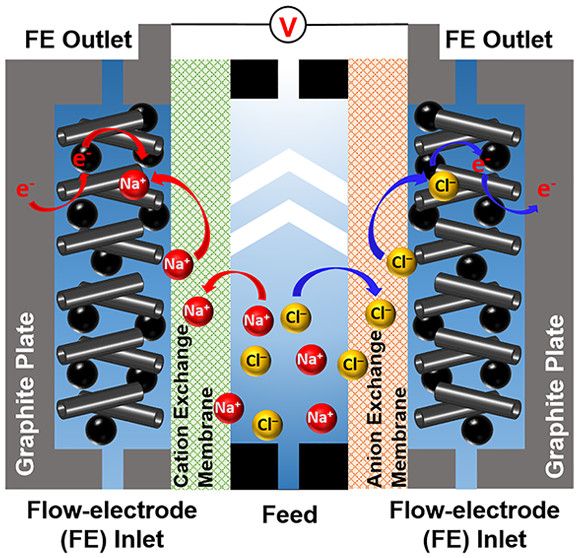Enhanced Water Desalination by Increasing the Electroconductivity of Carbon Powders
Published on by Water Network Research, Official research team of The Water Network in Academic
In this study, scientists used carbon nanotubes that enhanced conductivity and sped up a salt water removal process known as flow-electrode capacitive deionization.

A team of scientists led by Oak Ridge National Laboratory used carbon nanotubes to improve a desalination process that attracts and removes ionic compounds such as salt from water using charged electrodes. Carbon nanotubes have superior ability to conduct electricity. When applied to the desalination process known as flow-electrode capacitive deionization, the nanotubes boosted electroconductivity by 13.2 times and increased the desalination rate by 34 percent, with only a slight increase in solution viscosity.
The result was salt water removal efficiency of 93.6 percent, as detailed in ACS Sustainable Chemistry & Engineering. “The process is particularly good at treating industrial wastewater and could help meet the global challenge of fresh water availability,” said ORNL’s Costas Tsouris. He added that exploring the use of carbon fiber in the process could result in similar improvements at a lower cost.
Citation:
Kexin Tang, Sotira Yiacoumi, Yuping Li, Costas Tsouris, "Enhanced Water Desalination by Increasing the Electroconductivity of Carbon Powders for High-Performance Flow-Electrode Capacitive Deionization", ACS Sustainable Chem. Eng., 2019, 7 (1), pp 1085–1094, DOI: 10.1021/acssuschemeng.8b04746
Source: Oak Ridge National Laboratory
Media
Taxonomy
- Electrocoagulation
- Electrodeionization
- Electrolosis
- Research
- Desalination
- Electrodialysis
- Capacitive Deionization
- Electrodeionization